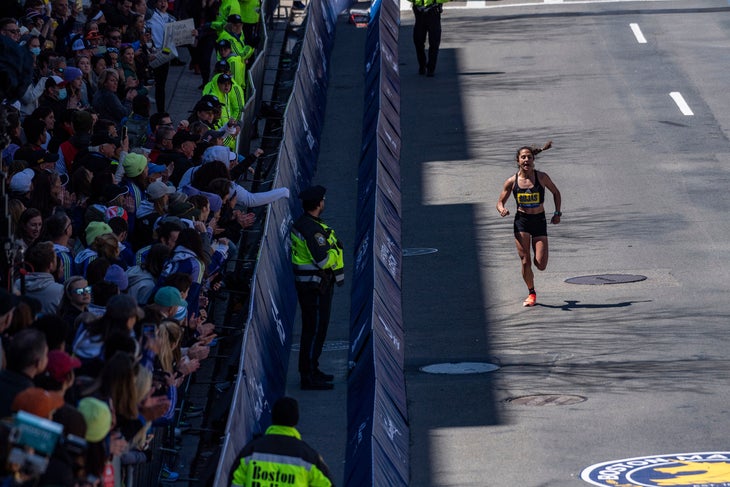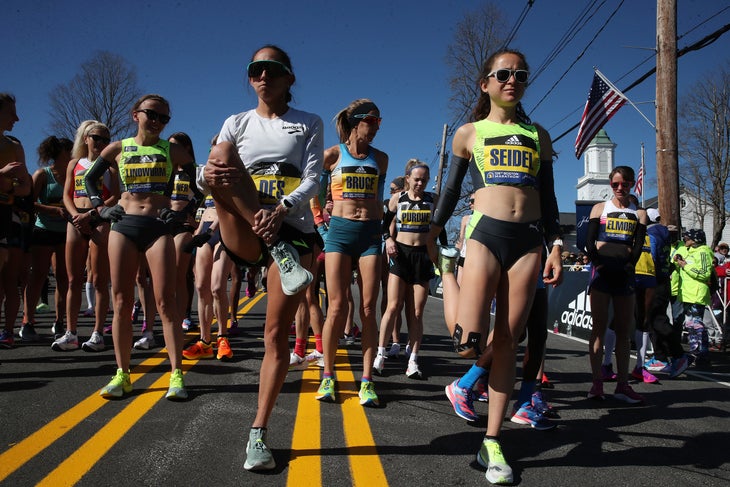Products You May Like
Get access to everything we publish when you
sign up for Outside+.
The women’s professional field on Monday at the 2022 Boston Marathon was touted as the one of the fastest ever to compete—which is saying a lot when the day also marked the 50th anniversary of the first time women were officially allowed to enter the race.
The top spots on Monday were dominated by the Kenyans, placing six women in the top 10, while Ethiopia took two of those spots—Peres Jepchirchir of Kenya was first, Ababel Yeshaneh of Ethiopia was second, and Mary Ngugi, also of Kenya, was third. The U.S. took just one of the top 10: Nell Rojas was 10th in 2:25:57, her fastest marathon by more than a minute.
RELATED: In a Battle on Boylston, Peres Jepchirchir Wins the 2022 Boston Marathon
Rojas, who lives in Boulder, Colorado, and is coached by her father, Ric Rojas, was also the fastest American in October at the 2021 Boston Marathon, when she placed sixth in 2:27:12. She said after the race on Monday that it was a relief to repeat as the top runner from the U.S.
“I think you do it one time and you’re like, ‘OK, that was lucky.’ You think it was kind of a fluke,” Rojas, 34, said. “And then once you do it more, you just believe in yourself more and you kind of realize you can actually compete with these people and you’re one of them.”
RELATED: Hiring Nell Rojas as My Running Coach Helped Me Qualify for Boston
It was also Rojas’s second appearance at the Boston Marathon as an unsponsored athlete—though this time it was by choice. She had signed an Adidas contract in January, but has since left the agreement because she said the brand’s shoes were not working for her. On Monday, Rojas wore Nike Alphafly shoes and a plain black uniform.

“It was kind of a lifelong dream to be a professional athlete, but I was with [Adidas] since January and unfortunately it just didn’t work for me. I had to make a really tough decision to wear a shoe that works for my foot and that I’m confident in and I knew I could stand on any start line and be competitive,” Rojas said on Monday.
WATCH: Nell Rojas’ Strength Routine for Well-Rounded Routine
Stephanie Bruce, who had previously announced that it was her last Boston Marathon before she retires from professional competition at the end of the year, placed 12th in 2:28:02. She noted that the worldwide talent is so deep right now—the times that the Americans ran on Monday would have once placed them much higher in the field not long ago.
“I think that a lot of reasons have contributed to that, but I’m glad to make it to the start line, make it to the finish line one last time here,” she said.
Bruce’s coach at Northern Arizona Elite, Ben Rosario, said the race played out how he had imagined it would with three women on the start line with 2:17 personal bests and a dozen having clocked faster than 2:23 before this year’s race. It was also a clear, cool day—only a slight headwind interfered with a threat to the course record (2:19:59, set in 2014 by Ethiopian Buzunesh Deba).
“I think on a day like this, if you’re the fastest person, you should make it fast. Why dawdle? I think that was a strategy that probably hurt the Americans in a way, at least what it looks like overall,” Rosario said. “They just got beat by better people. That’s OK.”
Before the weekend began, Desiree Linden, the 2018 Boston Marathon champion and two-time Olympian, said she had a slow start to her training after dealing with hip pain, but it had been feeling better and going more smoothly in recent weeks. On Monday she placed 13th in 2:28:47, her ninth running of the Boston Marathon.
“Every spot on the course I feel loved,” Linden said, later adding that the surges the leaders threw into the mix after five miles were destructive. “5:35 was my speed limit and I was over that a little bit occasionally. I was hoping that it would all come together and not blow up in my face. I expected to be in the fetal position at mile 19 just after going out a little bit too hard.”

Molly Seidel, Olympic bronze medalist, dropped out on Monday after the 25K mark with what she later described as a “hip impingement” that had bothered her during her training. She lost contact with the leaders before 15K.
“It was feeling good the last few weeks and no indication that it would hurt today,” she said in a text message sent by her agent, Stephen Haas. “I went out aggressively in the race but wasn’t able to hang with the leaders…by mile 16 I was in a good deal of pain and had to make the difficult call to stop at a medical tent to avoid really damaging anything.”
Sara Vaughn, who debuted in December at the 26.2-mile distance at the California International Marathon, winning in 2:26:53, said that she, too, had a difficult race in Boston. She started vomiting at mile four and was unable to keep fluids or fuel down for the remainder of the race—not an issue she’s encountered in training. Still, she finished 21st in 2:36:27.
“They cheer for you like you’re winning, even if you’re last,” Vaughn said. “Every time I wanted to stop, somebody would say my name. I stopped like four times and got sick, but everybody is cheering for you and that felt great.”
